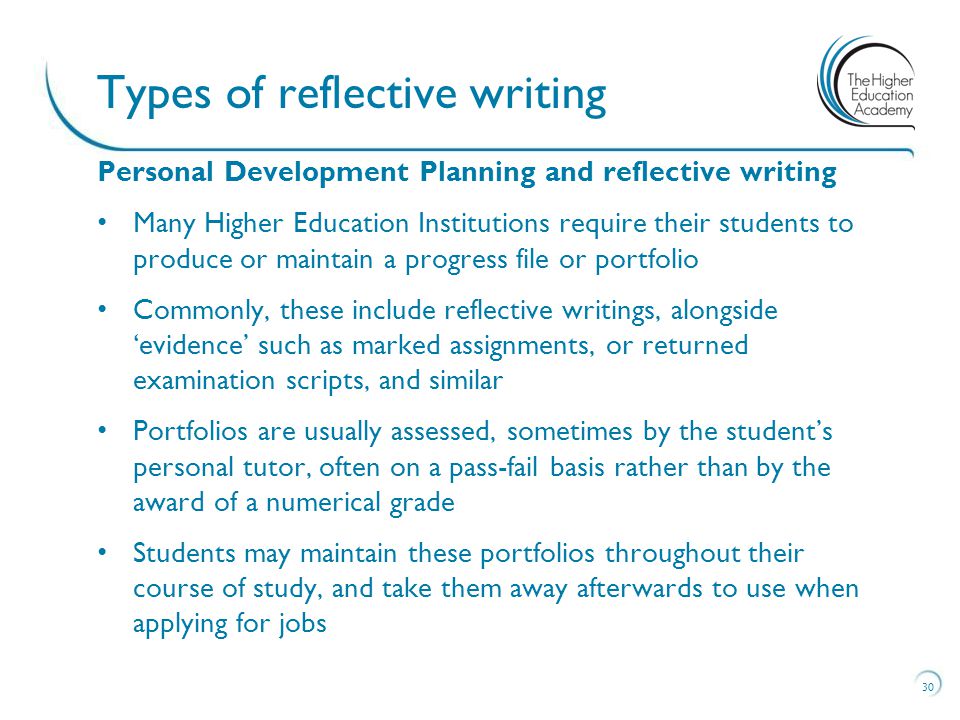2/5/ · Evidence still has a key role in reflective writing; it’s not just about retelling your story and how you felt. And evidence in the case of reflection will include your own personal experience which adds to the discussion. Reflective writing focuses on future improvements and answers questions like ‘what next?’ Reflective writing tips Aim to be descriptive in your use of language. You should use imagery, sentence structure and other techniques to bring your writing to life. Pay particular attention to A reflective composition is the result of introspection into past experiences or memorable events in our lives. We introspect into these memorable events and reflect over them with regards the emotions and influences they have left in our lives. In simple words a reflective essay is a piece of ‘you’ being presented in words
Reflective Writing Guide | UNSW Current Students
Aim to be descriptive in your use of language. You should use imagery, sentence structure and other techniques to bring your writing to life, reflective writing techniques. Pay particular reflective writing techniques to describing your thoughts and feelings about the event, experience, reflective writing techniques, person or thing.
Describe your emotions and reactions from the time it took place and from your perspective, to prove you have thought about it and are able to reflect upon it. Remember your audience. You will probably write about something from your own experience but the reader will be irritated if you keep writing in the first person "I went""I did""I saw""I got" without pausing to put across something more meaningful.
Try to make the reader share in the experience or feeling you are trying to describe. Make good use of description to create a vivid impression of the experience or feeling rather than simply listing what happened. Write your essay with an overall emotion or theme in mind - happiness, excitement, fear, sorrow - and plan the language and structure to match. Don't weaken the impact of your writing by including boring details. If it's not going to add to the feeling or reflective writing techniques you want to create, why put it in?
There should always be a sense of development. You need to think about how the experience has changed you or others, reflective writing techniques. You might consider what you have learned about yourself, how you have changed and what you could have done differently.
Statements such as, 'At the time', 'Looking back', and 'I can see now' can start the reflective thinking process. They don't really tell us how you felt about something, and they do not reflect your personality. Don't forget to check your spelling, punctuation and sentence and paragraph structures. Personal writing is a popular choice but you must reflect on the experience before you write.
This should help you to reflective writing techniques a boring account of events. Change language English Cymraeg Gaeilge Gàidhlig. Reflective writing tips Aim to be descriptive in your use of language, reflective writing techniques. Higher Subjects Higher Subjects up.
Writing a Good Reflective Essay: from Introduction to Conclusion!
, time: 14:38Reflective Essay on Writing Techniques I Have Learned | Bartleby

2/5/ · Evidence still has a key role in reflective writing; it’s not just about retelling your story and how you felt. And evidence in the case of reflection will include your own personal experience which adds to the discussion. Reflective writing focuses on future improvements and answers questions like ‘what next?’ A short guide to reflective writing 5 Gibbs’ Reflective Cycle Graham Gibbs () created a reflective learning cycle, including the role of feelings: Description What happened? Evaluation What was good and bad about the experience? Analysis What sense can you make of the situation? Action Plan If it arose again what would you do? Feelings What were A reflective composition is the result of introspection into past experiences or memorable events in our lives. We introspect into these memorable events and reflect over them with regards the emotions and influences they have left in our lives. In simple words a reflective essay is a piece of ‘you’ being presented in words

No comments:
Post a Comment